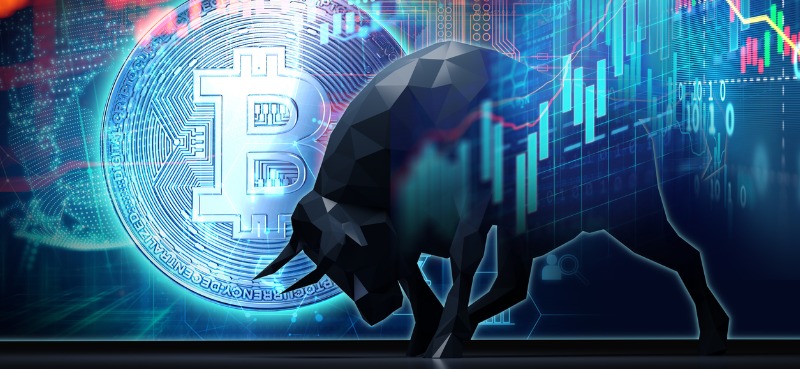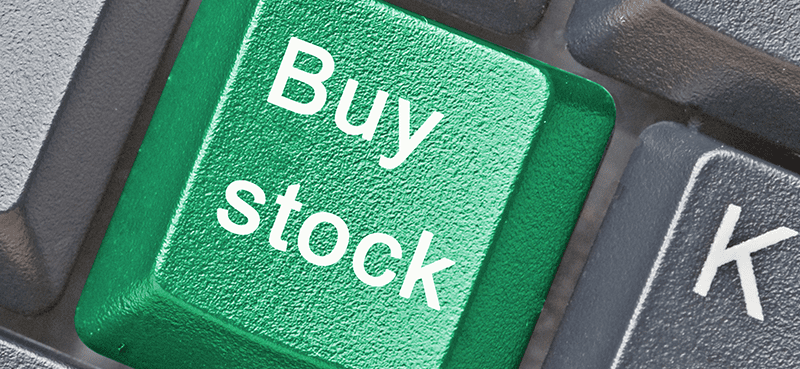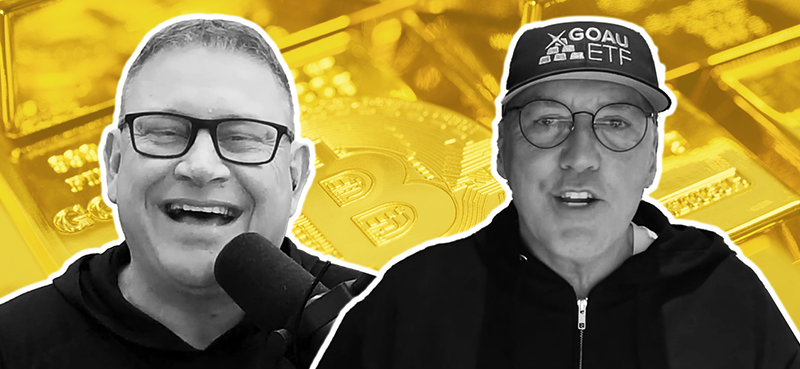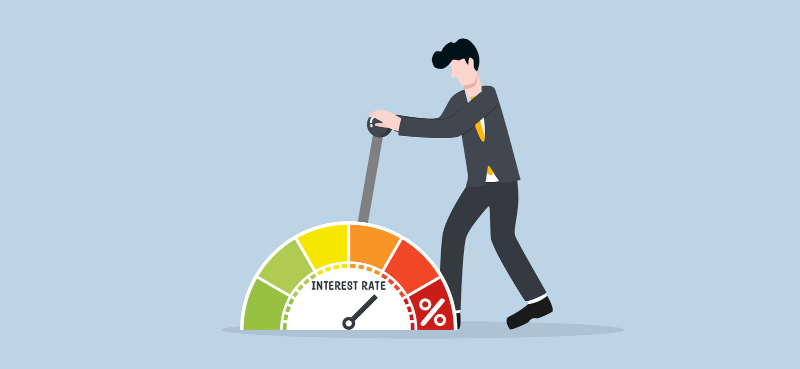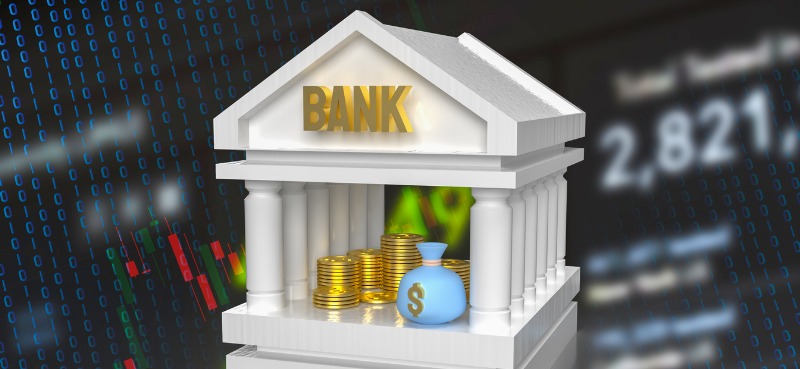Frank Holmes, CEO and chief investment officer at U.S. Global Investors, needs little introduction—he’s one of the most well-respected financial experts in the world.
Today, he breaks down his thoughts on the current state of the stock market… including the surprising sectors seeing renewed activity.
Then later, he discusses bitcoin vs. gold—and explains why both can be great hedges… and why he sees the price of gold reaching $10,000 per ounce. [26:26]
- Guest: Frank Holmes, CEO & CIO of U.S. Global Investors [26:26]
Wall Street Unplugged | 723
Could gold go to $10,000 per ounce?
Announcer: Wall Street Unplugged looks beyond the regular headlines heard on mainstream financial media to bring you unscripted interviews and breaking commentary direct from Wall Street right to you on Main Street.
Frank Curzio: How’s it going out there? It’s May 27th. I’m Frank Curzio, host of the Wall Street Unplugged podcast where I breakdown the headlines and tell you what’s really moving these markets. So everything is open by me. As you know I live in North Florida, and we’re not really on lockdown. I mean, hair salons have closed, restaurants take-out only, stores were closed. They decided to close the beaches a little bit later, but people were walking around and practicing social distancing, lots of cars on the road, but wasn’t like, stay at home or you can’t go out at all, or anything really enforced. But now, everything is open.
Frank Curzio: And have to tell you, it’s never been more busy. If someone has been in Northern Florida for 12 years, I’ve never seen it as busy as it is right now. At Starbucks, I go to a couple times a week I waited over 20 minutes on the drive-thru, and it usually takes me five minutes. Got ice cream with the kids at Cold Stone, and there was a line out the door. We went there because we were going to get some ice cream at Dairy Queen, but the line was 25 cars into the street. There’s a really cool restaurant we have on the beach here. It’s outdoors, kind of casual, there’s burgers, seafood, nice place. I took two of my employees there who were in town, who were driving through. I said, “Yeah, I think it’s open.” Opened a couple days ago, packed. Jammed. I mean, social distancing is in practice, you have room between the tables, they took some tables out. There was people outside waiting for tables.
Frank Curzio: That place has been open three years now, it’s a hotspot, and I found the last parking spot which is all at the end of the parking lot. It’s a big parking lot because it’s also the parking lot for the beach because it’s on the beach, but I’ve never parked that far away. I had to park that far away to get into this restaurant. That’s how crowded it was. I’d never saw anything like it. So what does that mean? And let’s analyze this for a minute because it’s just one area, I don’t know if you listen to this from California, a lot of listeners from California, New York, even overseas, where you may be on lockdown. That’s cool, but I want to hear from you and what you’re seeing, frank@curzioresearch.com. I’m telling you from someplace that’s fully open. When you analyze this, let’s look how this translates into the stock market because we’re seeing a massive, massive rotation this week. And those left for dead cyclicals, like industrials, financials, hotels, casinos, airlines, furniture companies, clothing retailers, cruise lines, you name it. But many of these names that have not really participated that much in this rally, and are cheap if you’re looking at 2021 earnings, you’re seeing these companies move incredibly higher here.
Frank Curzio: And when I say rotation, I’m not too sure if it’s new money coming into this market or if it’s just a rotation out of large cap tech, which is trading at valuations we haven’t seen since the tech bubble 20 years ago. But a lot of these names are catching a bid, in fact just recommended two of these small cap names in Curzio Venture Opportunities. If you’re a subscriber, you’re probably reading that now. You should’ve got it right now as this podcast is being released. And these are names that are up 100% from their lows, were very dangerous, but still down 25% or more from their highs. Now, if you’re watching financial media, which we all do, it’s my job to watch, to see what the consensus is, to see what the attitude is, the sentiment is, that’s why I watch it. I don’t recommend watching it for everybody because it’s … with markets up, everyone’s bullish, when market’s down, everyone’s bearish. Just the way it is. But if you’re watching the financial media, they’re saying, “Well, these stocks doing great because of the reopening of states.” It’s a great explanation, makes sense, as companies who saw revenues decline more than 80% due to the lockdown are going to start generating revenue again.
Frank Curzio: And even though there’s revenue, it’s not going to be near pre-coronavirus levels. We talked about that. But it may go from 10, 20% degenerating to 40, 50% over the next few months and then maybe 80% by the end of the year. It’s not going to go to 100% because a lot of these… restaurants are moving tables, you have old people who are not going to go out as much. Again, we’re not going to get back to those pre-coronavirus levels for a long time. But just the fact that you’re seeing traffic is encouraging. It’s great news for the economy. But I’m not sure it’s that simple. Because it’s not necessarily new money coming into the market. Like I said before, it’s a rotation out of the FAANG, out of Microsoft. I mean large cap tech names, the run that they had and the fact that NASDAQ’s trading 4% off its all-time high, considering where unemployment is, GDP. I mean, there’s some companies that deserve it, their sectors are going to be changed forever. Commercial real estate’s going to be changed forever. We all know that. And software companies, companies like Zoom, again, those companies are trading at highs and they deserve to.
Frank Curzio: More people stay at home, they’re going to be using certain products. So, you see in that rotation, and you may be saying, “Frank, you told us. GDP is going to decline every quarter this year. The unemployment rate is going to go over 20% which is going to result lower spending and that’s going to result in…” It’s going to crush consumer confidence, which is a key driver of spending. These are things that I’ve been mentioning over the past two months where we’re not going to see things get back to normal, pre-coronavirus levels at least through 2021, yet the market training evaluations we haven’t seen in 20 years, and we had some of the greatest investors ever, Drunkenmiller, Paul Singer, David Tepper, billionaires who told you two weeks ago how dangerous this market is. And they’re right.
Frank Curzio: We’re in a recession, maybe in a recession for several quarters, yet stocks are trading in their all-time highs. The S&P 500’s now up over the past 12 months. NASDAQ closing in on those highs. All-time highs, crazy. But if we really look what’s happening with the economy, it’s unprecedented. I mean, it’s something that’s totally different that we never see and it makes sense when you break down the numbers. And I’ve been doing this, I’ve been breaking down numbers for past couple weeks. Why? Because, look, we will able to get out of this market or participate in the rally in our newsletters, but I’ve been cautious, very, very cautious, very surprises move higher. And for me as an analyst, I’m like, okay, what am I getting wrong here?
Frank Curzio: Because when we look at what’s happening with the economy, and this could be called a top-down approach over the economy, it filters down the stocks, and then you look at individual names really from the bottom up of who’s going to benefit from money flowing into sectors. Because it used to be a high unemployment rate, 20% plus, I mean, we’re going to be at all time, record unemployment. Means tens of billions of people are out of work. Which translates into they’re not going to have money to spend on discretionary items which drives the economy. And then what do you see with such a high unemployment rate like that? And it was 10% during the credit crisis; it’s going to be over 20%. I mean, it’s insane. But what happens? Well, friends, family members that have jobs, they see these people, right? They see their family members, they see… they lost their job, they begin to close their wallets because it makes sense. They’re afraid they can lose their jobs. We have trouble paying the mortgage and our kid’s tuition. That results in more savings, which we’re seeing.
Frank Curzio: We’re seeing the saving rate explode higher right now. People are worried. But it’s interesting. Because today, our government is paying people on unemployment more money than when they were actually working. And it gets better because the government is sending these same families checks of $2,400 if you’re married. So you got to be ,married making less than 150. And I think from 150 to 200 just filters out, and I think over a certain amount, you’re not getting anything, but it’s not just 2,400. If you have three kids, that’s another 1,500 because they’re giving away $500 per kid. You’re looking at numbers that are just incredible.
Frank Curzio: And checks of up to $4,000, close to 4K. And that’s not it, because there’s an additional probably 3-4K coming as these families are going to get during the next stimulus checks, the next wave of stimulus that they’re talking about, which could be 3 trillion, 2 trillion, whatever it’s going to be. Throw in the fact that people are not paying rent, or don’t have to pay rent for a couple of months, or mortgages are getting forgiven on that, especially mall owners. You got small business loans that you may not have to pay back. And if you do, it’s going to be in a 1% interest rate, which the whole world… every small business in the world would borrow trillions if that was the case, if that stayed that way. And some people are not even paying their mortgages.
Frank Curzio: And what does this translate into? It translate into people having more money today than ever. Whether you’re unemployed or not, and some people are struggling out there, and I get it. But the amount of money that’s being given to people is unbelievable. Unprecedented. And it almost makes it for the unemployment rate, it doesn’t matter. It doesn’t matter what the unemployment rate. Why? Because it used to be well, you’re unemployed. It just explained it, that money filters into the economy, filters into companies, buying, earnings, earnings drive stock prices, that’s how we’re used to the system. It’s very simple, it’s always operated like that. But now, you bypass the whole system and you say, hey, you don’t have to work, and here’s more money and you give them directly for free. I mean, it’s like a diet pill that helps you lose 100 pounds in two months. And I’m using this analogy because what do you think is going to happen to that person who lost 100 pounds and now has a body that they like? They’re going to want that pill forever. It’s normal.
Frank Curzio: It’s a normal human reaction. If you’re giving things to people, they’re going to expect it, they’re going to expect it forever. Which could lead to a lot of problems down the road. Protests, civil unrest and unemployment remaining high, people refusing to go back to work, which we’re seeing right now. I read the stories out there where they’re looking to hire back some of these employees and they’re like, “No, I’m okay right now.” And companies are fighting back saying, “We’re going to say that…” they have to come back if they want to get paid, but they’re doing everything they can to stay at home. And it’s crazy out there. It’s crazy. If you look at it, for every action, there’s an equal and opposite reaction. Yes, that’s Newton’s third law, but you get my drift. What you’re doing, there’s going to be a reaction and people who are getting paid this money, which is a ton of money for them. And it could be up to $8,000, probably $7,500 or a little bit more than that in stimulus checks if you have kids. And if you have 20 kids, good for you. Probably don’t have to work for the year. And you’re getting paid all this money on unemployment, and it could happen for the next three, six… you get used to that, right? Now those problems are more longer term, but in the short-term people are spending.
Frank Curzio: You’re going to see it when your economies open up if they haven’t already. They’re buying homes like crazy, just ask your real estate agents. Is there market that kind froze a little bit over here, and then one day there was bids and people fighting back and forth and raising their bids here. I mean, it was a pretty hot market here for residential homes. And then, everyone’s like, wait a minute, holy cow, what’s going on? Again, we did a great job scaring the shit out of everybody. You’re going to die if you go outside, you’re going to get the coronavirus and the world’s going to end. Heard that from so many different people. I mean, you look at the forecast of what were predicted, even by the leading infectious doctors in the world, have been so wrong. And I’m not picking on them because this is something that never happened in the history of a country. Yes, you can bring back other pandemics but nothing like this, where it spread across the world and economies were fully closed. We’ve never seen something like this. So, it’s better to project out the worst case scenarios than not.
Frank Curzio: And be like, okay, not that many people died compared to not being prepared, which we weren’t at the beginning with hospitals. But I get it. For real estate, I mean now, you put your house on the market, it’s gone. It’s gone. I mean, talk to your real estate agent, email frank@curzioresearch.com, you’re going to hear that. I have tons of people in the real estate industry that listen to this podcast and they tell me the same thing all over the country. May be wrong, maybe your area is different. That’s fine. That area is the same, but most areas that’s what I’m … That’s why I do this podcast, to tell you what I’m hearing out there. There’s no bias, I’m not bullshitting you. I’m telling you if people said, “Nobody’s buying houses,” and I got 100 emails and 85% of them were, “Hey, the housing market’s terrible.” I’d say, “The housing market’s terrible.” I’m telling you this to get ahead of things, that’s why I’m having this podcast and that’s why I love having listeners write in to me, frank@curzioresearch.com. They’re buying discretionary items, they’re going out to dinner more, they’re looking to get out of the house.
Frank Curzio: And it’s going to drive stocks in the short term, probably through next quarter or two, but eventually numbers are going to matter. They will. I mean, this year, they don’t matter. Companies are getting a pass, removing guidance, it’s coronavirus, don’t worry about it. We have no idea what you’re going to earn, who cares? We know that it’s going to be a 20% decline based on those numbers you’re trading at 40 times forward earnings. Nobody cares. Even though your stock historically trades at 18 times forward earnings, is trading at 40 times forward earnings and those earnings estimates are probably super aggressive. Nobody cares. That’s the way the market is, don’t fight it, that’s the way it is. You look at these companies removing guides, but in 2021, when sales and earnings are down 20% still from your pre-coronavirus levels and your stock’s trading at an all-time high, or you’re trading at 30 times forward earnings, you’re going to see a major adjustment similar to what we saw in the dot com crash because this is a market that’s like the dot com crash.
Frank Curzio: Similar as… We ran up. Where the NASDAQ was super expensive in 1998, and it started coming down. I don’t have the exact month, I haven’t done tons of analysis on this, but it started coming down, people are like, “Okay, here it is.” And then amazingly, from 1999 to 2000, the NASADAQ doubled. It doubled. We had the extreme fear or you have people on the sidelines, or you have the best investors in the world saying, “This is the most dangerous market.” It is, but it doesn’t mean it can’t go higher. You have to be aware of that. To me, it surprised the hell out of me how much higher it’s going. But when you see what happened in 1998, ’99, when these stocks were insanely expensive, one of the most expensive markets of all time, and we’re getting to that point right now, almost comparable. And what happened? We saw the biggest crashes ever over a two years span. I mean, it was terrible. Horrible. These technology stocks, even the rest of stocks, they really performed well, but the NASDAQ got destroyed. Well, look at this market. If you’re wondering where we are, that’s where we are right now.
Frank Curzio: And it’s amazing because people say, “Wow, the economy’s good.” It’s not so much that the economy is doing better and these companies are playing catch up where you’re seeing new money come into this market. It’s a rotation. And that could be from the algorithms or whatever, but it’s out of large cap tech names, which have driven this market tremendously, and into lagging cyclical names. Man, I’m taping this on Wednesday, middle of day. You’re getting this a couple of hours. When was the last time… this happened today. The Dow Jones is up 1% when the NASDAQ was down 1%. Do the research. I haven’t done it yet, send it to me. I’m curious. I think that’s insane. Love to see someone provide that data for me because I’m busy these days. Because you have many large cap names like the Microsofts, Apples, the Intels, yes, they’re in the Dow. So, you see these names down, and the Dow up so much, it tells you that many other stocks are doing well in the financials. Goldman Sachs, JP Morgan, surging. People probably realizing, especially JP Morgan, wow, I can get a three and a half, 4% dividend. Yeah, profits going to be terrible. We had Jamie Dimon say yesterday at a conference that our dividend is perfectly safe. We’re going to continue to pay it, not so much buybacks, but where are you going to park money these days?
Frank Curzio: Where are you going to park money and earn interest rate? And the spread between the S&P 500, the yield on the S&P 500 and a ten year is at its widest gap in history. We’re looking at 10 years, around 2% on average forever, since its lowest level in history. What’s it? 0.7 after inflation? Which is going to surge. It is going to surge. Believe me, it’s going to surge. We’re spending 12 and a half times more. If this next 3 trillion gets passed, 12 and a half times more than we spent during the credit crisis to save the whole entire financial system. Believe me, we’re going to see inflation. We will. Be on anyone’s expectations. That’s inflation, those returns are terrible.
Frank Curzio: But JP Morgan say if you want to park money in there for three, four years, you think it’s going to be higher than where it is now? I don’t know. Probably, a little bit. I don’t think it’s going to get crushed. It’s trading near book value which is usually a great sign for banks to buy, you can park money there, earn nice 4% dividend. Makes sense, right? For some of these companies. And where else you going to put the money? Believe me, trillions of dollars especially for yield as risk-free as possible. It’s just what happened during the credit crisis when the market crashed. AAA loans for all loans that were bullshit under the hood, paying the rating agencies again… I won’t get into that, you guys know the story from there. But you saw trillions flow in because everyone thought, hey, this is a safe investment, I can generate a nice yield. That income, you can do that with some of these stocks now. But seeing that rotation, and that’s just the financials, it’s… McDonald’s is catching it big, Caterpillar, Boeing, catching a bid here.
Frank Curzio: And Boeing’s worth 400 in change and the 130, 140. I don’t know what it is now in the market up to the past few days, I haven’t looked at it, but still down a ton. So, there are many of these stocks that are catching a bid. They’re still down a ton off their highs, but it’s a rotation. It’s not more money coming into the market, a lot probably has to do with algos. But it’s just amazing, it tells you how expensive a lot of these big cap tech names have gotten relative to the rest of the market. And I’m seeing that especially in small caps. If you’re looking at value based small caps, nine out of the past 10 recessions, small caps outpaced large caps.
Frank Curzio: And right now, it’s one of the widest gaps that you’ve seen. Comparable to one or two other times in history of how much large caps have outperformed small caps. Now, the growth names in small caps doing okay, the value names have gotten crushed, and the value names usually outperform the markets when you see inflation. So, if you’re a believer like me, you’re going to see inflation. There’s a lot of value names in the small cap index that could go up 3X, 4X, 5X. And these things have gotten decimated, and you know value alone has gotten decimated, right? Nobody wants values; it’s been a growth market for 10 years. We see inflation, a lot of these value names going to come back into play. It’s not just a short-term rotation. But there’s a lot going on here, guys. I mean, researchers have been digging into… I never thought I would be telling you that the unemployment rate doesn’t matter.
Frank Curzio: There’s no one in the past 30 years that would tell you that. Metrics that the greatest investors look at to determine the market, to forecast, no longer matter. You could bitch about it, you can complain about it or you could say, “That’s the way it is right now,” and you got to change, and you got to adapt. As a 20-year vet, I’m trying to explain things to you and it’s not easy. It’s nice that stocks are going up. It’s nice to Robinhood accounts are at all-time highs. Where Millennials are buying, where you’re hearing… I have friends. I got my haircut, real haircut first time and my hairdresser’s asking me, “Oh, how do I open up a stock account?” Usually a sign that it’s a top, I don’t know, maybe it’s not. Things are different. People say, hey, you look back historically, and most of the time it rhymes or it’s… This is different. We’ve never seen super low interest rates like this, at zero fueling the market.
Frank Curzio: We’ve never seen trillion dollar stimulus packages pass like it’s nothing, like it was just a decision two people made when they’re having a beer. Well, you know what? We should pass, let’s do another trillion dollars. Okay. And 3 trillion is already been passed, another 3 trillion, and I mentioned it before, is a stimulus package to basically fix a temporary problem where we might not get back to normal in 12 months. It might take even 36 months, and there’s industries that are going to change forever, like commercial real estate and information technology, they’re going to benefit. I get it. But if they pass another 3 trillion, I’m not even talking about another trillion on top of that with infrastructure, but another 3 trillion is likely going to be passed. 12 and a half times greater than TARP. And TARP was used to fix our entire financial system.
Frank Curzio: And also keep in mind this next three trillion, maybe it’s two trillion, maybe it’s four trillion, if you throw in infrastructure. It’s going to come at a time when stocks are actually higher, they trading higher over a 12-month period, and then NASDAQ is close to its all-time high. Insane when you think about it. I know. I looked at the numbers, I crunched the numbers, I see what’s going on. And just to see where the markets are right now and the anticipation that everything is going to be fine. China relations are going to be fine, Europe’s going to be fine, even though they were in a recession pre-coronavirus.
Frank Curzio: China is going to start seeing huge growth again, even though growth was slowing incredibly, and they’re having problems with Hong Kong. To assume that everything’s going to go back to normal there… is a lot of assuming. But we can go up more, which we’ve been doing. As states open, people more optimistic, you’re going to see people spending because they have money so the employer rate isn’t going to matter as much, but eventually, those numbers are going to matter. Go to talk more about these crazy times, give you credible insight is 30-year plus market vet, Frank Holmes. Frank is the CEO, Chief Investment Officer, at U.S. Global Investors, firm with close to 10 mutual funds. There’s two major ETFs; GoGold is one of them. He was nice enough to invite me during the closing bell, it was 2017. And his other ETF is JETS, J-E-T-S, the largest airline ETF in the world that they launched several years ago. So, Frank’s going to break down the airlines. He knows more about this industry than anyone including Buffett, someone that studies statistics, everything. This is his industry. He’s the person who’s running this ETF, he knows more about airlines, believe me, you’ll hear that in a second.
Frank Curzio: He’s going to tell us how to invest in the best names in the industry. And it’s not some sugarcoated thing and I know I even called… I know it’s hard not to be biased, and he gives you a fair analysis. So, it’s going to be awesome, definitely listen up. He’s going to break down two of your favorite sectors which are gold and bitcoin, which is kind of amazing because Frank is one of the few people I know that’s been the gold industry for such a long time. It’s been a focus of his firm, not totally focused. But he’s one of the few in the industry that says you can own gold and bitcoin, where you have the diehard crazies in bitcoin, diehard crazies in gold, and gold bugs, they believe that they can’t coexist, you need to own one or the other, even though the thesis for owning gold is the same for owning bitcoin. Frank’s going to break down both of these markets… expert in both of these industries, especially bitcoin. Been in cryptocurrencies for a while, he’s going to break a lot of this down and share some of his favorite investment ideas with you. So awesome interview guys, and let’s get to it right now. Frank Holmes, thanks so much for joining us again on Wall Street Unplugged.
Frank Holmes: Great to be with you.
Frank Curzio: Well, let’s start with the elephant in the room, which is the coronavirus. You’ve been ahead of US Global since 1989, so 30-year plus vet in the financial markets. Have you ever seen anything like this in your life, where unemployment is going to go over 20%, GDP down more than 30%, and even GDP expect to decline every single quarter of this year. It’s going to bounce back, but it’s still going to decline every quarter, that’s what’s projected. Yet, we’re seeing stocks rally to where the S&P 500’s up over 5% over the past 12 months and NASDAQ closing its all-time highs. I mean, does this compare with anything that you’ve seen in the past three decades?
Frank Holmes: Never. Never, never, never. Bad news is good news in that it’s just also to shock me during this period, there’s all these headwinds of fear and online trading explodes, 2 million people. New accounts, and Robinhood supposedly brings in the month of March a million accounts, Schwab brings in 300, some-odd thousand reported. TD Waterhouse reports over 300,000 new accounts. So, the millennials being bored at home are now becoming active speculators in the stock market. I would never have expected that.
Frank Curzio: Is that a sign of a negative or a positive in your view? Because usually when we see people like that who are in tune with the markets and see everything now going up and jumping in, could that be a sign of a top or is that good that… the market, hey, more people are interested in it than ever.
Frank Holmes: I think it’s really positive because one of the big parts is I’ve noticed from our shareholder base is that the average age in the mutual fund world continues to rise, and there’s not that much new blood. But they start piling in right at the bottom. I know for my JETS ETF, after it halved, all of a sudden, the volume from… like Robinhood allows you to look at the number of accounts every day in that ETF. And it’s unprecedented from a couple hundred to 24,000 shareholders in a couple of months. So that happened on the gold ETFs also. So, there’s a brand new audience of investors that are buying into the American Dream to speculate, to invest for growth. Whereas a lot of times, they were just out of the market.
Frank Curzio: Let’s get to JETS because you’re one of the smartest people in the world when it comes to airlines. So, in 2015, you launched the biggest airlines ETF and that’s the symbol, JETS, J-E-T-S, and we all know the story with this industry where pre-coronavirus… I mean this is a booming industry. It was also not that expensive considering where… record profits, capacity, cash flow records, everything close to all-time highs for most of the airlines. Now we… look, coronavirus hit, most of the names got destroyed, capacity at all-time lows temporarily, Buffett decided to exit the industry, big headline news. Is this an industry…? And I know it’s going to be biased because you have JETS, but is this the time that you’re buying aggressively or you’re still cautious on the industry?
Frank Holmes: Well, that’s a jump off Frank. Is it a U-shaped bottom or is it a V-shaped bottom? Now lately, I’ve been hearing, it could be a W or a Nike swoosh. But I think the airline is going to go through a U-bottom. I think that unemployment numbers are going to crash and just explode on the upside because everyone’s now going back into the workforce. So, I think you’re going to get a V-shape there. But I think the airline will just be… people will be more cautious.
Frank Curzio: And do you think it’s a huge advantage? Because most of these airlines have gone through bankruptcy. Yes, that was a little while ago. But remember, it’s been over 10 years since the credit crisis. And we have a lot of new investors in the market since ’11, ’12… even new companies and IPOs where, unfortunately, everyone’s super aggressive and thinks are going to grow forever, and nobody holds money for a rainy day. But the fact that the airlines have been through this, just like the Microsofts and the technology companies, which is why they’re thriving right now. After the tech boom, so many of them went out of business. Do you think it’s an advantage going through this type of market, where there’s going to be much more lean on the other side?
Frank Holmes: Yeah. Oh, yeah. I think that rotation and companies… the Amazons just were remarkable what they did… I know in San Antonio, former employees that worked in my mail room years ago work at Amazon, and they were always doing overtime, and all that overtime was slashed. And they went out and just hired more people. And you can see Amazon has performed exceptionally well, and I think the Zoom was interesting at the very bottom of this airline industry, Zoom had a bigger market cap than all the airlines.
Frank Curzio: Incredible. That’s incredible.
Frank Holmes: So, there’s a mean reversion going to take place here, and I don’t think Zoom’s going to fall as much as the airplanes have a rebound. But what I found was really interesting was how many hedge funds came in at the beginning, shorting their favorite airlines that they believe had bad debt levels and went long JETS, something like $50 million quickly came in. And then we had all the Robinhood and retail investors coming in, speculating. And we did some research, and a big part of that, coming in besides the coronavirus worried about debt levels, but there was a big bet, that if you looked at 2000… if you go back to 9/11, six months after 9/11, airlines were all shut down for over a week. They came back on six months later; they’re up 80%.
Frank Holmes: And then if you look at the SARS phenomena, which impacted a couple years later, but that was predominantly Asia, the airlines jumped back 120% in six months. And if you go March 2009, low, six months later, the airlines are up. And remember, that time they’re all bankrupt, basically still flying, but they jumped 80%. So, there’s a big bet here that the airlines are going to jump 40 to 80 to 100%. And it’s call: Do you have a V shape or a U shape? And guys like Bill Miller came on television, contrary to Buffett, and were saying that, “If you believe a vaccine’s going to be here in six months, then the airlines are screaming bye.”
Frank Curzio: Now, forget about you that your company, with JETS and everything and someone who just super in this market, who loves data analytics and followed Buffett for a long time. Were you surprised at Buffett getting out of the airlines, someone that likes to buy things during market conditions like this, when they get wrecked? And this is more of a temporary problem. It could last three years; it could last five years. Yes, it’s going to be different, but this is the opportunity that he really looks for, and yet, I was just surprised that he decided to sell out of his airline so quickly.
Frank Holmes: Yeah. At the beginning, it was a real shocker, Frank. He was a real shocker. But then, I had to sit back and scratch my head, and in my webcast last week, to only registered investment advisors, we had like 900 people registered for it across the nation. And one of the things was, I would open and show some visuals where Buffett said at his annual meeting a couple years ago, “I was too dumb to realize. I did not think business could succeed on the scale he has.” And another one where he talks about Google. “I never thought Google could do what it’s done.” And that’s a shocker because Google does a billion dollars a week of operating cash flow. Operating cash flow. And it’s unbelievable numbers, 50 billion a year, and he missed that. And then he said, he doesn’t miss Bitcoin and then gold. He always talks negative about gold, but since the year 2000, bullion has far outperformed Berkshire Hathaway, and over the 20-year run, 16 of those years has outperformed.
Frank Holmes: So, it’s almost double what he’s done. And for the past 10 years, my favorite Franco-Nevada royalty company has far outperformed Berkshire Hathaway. So, he’s been negative on gold, he’s been in and out of airlines at the beginning of March, he was increasing exposure to Delta, then he jumps out. And I got to understand him; he’s a wonderful investor. He’s amazing steward for people getting into the capital markets and teaching, but he’s 90 years old come August this year. And if you look at the data points, the median age of someone dying is 82. And so I think he’s much more sensitive about his life, so I can understand it that cautious mode because he didn’t buy in a lot of industries on this big sell off, because on previous big sell offs, he was a big buyer. He bought Goldman Sachs, he bought a whole slew of companies. But this one he hasn’t, and what’s interesting is that all the complaints of tarp money took place in 2008. The amount of money now by the Congress and Federal Reserve is 12 times that. I think you covered that in one of your tweets.
Frank Curzio: 12 times the amount, yes, that we past the TARP right now. If we pass the extra 3 trillion, and that’s not even including the extra trillion that they’re looking to pass on top of infrastructure. So yes, I did tweet about that. But it really is incredible and that leads… let’s get into gold.
Frank Holmes: Let me give you something else on this. What’s different though, and what the learning lessons in my research was that Washington agencies, FAA, etc. and the White House and Congress, are really cognizant and sensitive that one in 15 jobs is tied to the airline industry. And it’s a huge multiplying effect. Over 95% of people going to Vegas fly there. There’s 200,000 empty beds, 300,000 people laid off. They’ve got to get people flying to Vegas again to ignite all those jobs. And so, you have a big commitment, and unlike 2009, 2008, there was no $25 billion given to the airline industry. So, I think there’s a real interest besides Buffett switching in and out, but the government committing to this industry to get it back on his feet. You look at the Latin America, the governments there did not support their airlines, and two of the major ones have gone bankrupt. You’re seeing several countries in Europe support them. So, I think that this is a very different scenario for job creation and it’s an election year. So, I think you’re not… wheels are up. And when it comes to the JETS, wheel’s up.
Frank Curzio: Yeah, and I love talking to you Frank because just the data analytics guys, listening to this… listeners out there, it’s just understanding and knowing some of the countries that are bailing out airlines and the ones that aren’t. The ones that aren’t, that your debts going to be increased business for the survivors, even some of the international, the larger ones, United Airlines, United Delta, but just knowing that data too, that’s why I always love talking to you. But I want to switch the focus…
Frank Holmes: One last thing I’m going to blow you away with.
Frank Curzio: Go ahead; let me hear it.
Frank Holmes: Besides the data of all these new online speculators and investors, is the TSA started showing the data of how many people they process every day. It’s going to become like a stock chart. So, the data comes out, and you can see, they start this on March 25, and by April the 14th, is 87,500 people get processed. That’s the low, April the 14th. And what I found is interesting, it’s now over 300,000. So, we’re up over 300%, almost 400% from the lows and people flying daily. We’ve got a long way to go, Frankie. Last year, it was 2.5 million this time a year. But there’s new data, people are using Google Analytics to look for people looking up for holidays, for tourism. That’s booming in Asia. So, there is a pivot turn and there’s new metrics to look at, to say, how do you trade these puppies?
Frank Curzio: Yeah. And you can just go to the FAA website for that, or where would you find data like that?
Frank Holmes: Yes.
Frank Curzio: Okay, great. Now, that’s great stuff. And the reason why I’m going into gold, and I know you and I could definitely talk airlines for another hour, but we have a lot of gold investors here as well. So, when I look at your company, US Global, you have close to 10 mutual funds. I think nine and two exchange traded funds, which one of them was JETS, we just talked about. But let’s go into the other one, GoGold, symbol’s G-O-A-U, which I know a lot about since you graciously invited me to ring the closing bell in New York Stock Exchange in 2017, amazing experience. But talk about GoGold a little bit. What’s different from GoGold from, say, other ETFs like GDX?
Frank Holmes: Well, the big difference is a quant discipline. And that is very, very important because what we noticed was that GDXJ was just a basket of small cap, mid-cap, big cap names, and the GDX was big cap names. And there was no discipline in looking at metrics, and what we found was that if you looked at just free cash flow yield or cash returns on invested capital, you bought a basket of those stocks, you far outperformed the GDX or GDXJ.
Frank Holmes: And gold looking back over 10 years it was a 90%… rolling 12-month basis it will outperform the GDXJ 92% of the time. So, it was very compelling, and the reason for that is a lot of silly mergers, financings that never delivered the revenue per share, never delivered the reserves per share. And interestingly enough, 70% of all trading today are done by quant funds. And the quant funds look at different factors than how gold stocks used to be communicated and invested. I hope people said, “Okay, I’ll speculate or invest in this gold stock versus one versus the other.” It’s all changed. And it’s much more like how you and I would look at growth and revenue per share, high cash flow returns on invested capital, not the old adage of what’s your book value or reserves per share. And so what we found was that there is a process of shrinking from 70 names down to a very tight basket of 28 names.
Frank Holmes: And then what we also noticed is that the royalty companies, which I’ve always loved, Frankie, always because it’s a superior business model has a moat around it. These companies have the highest revenue in the world per employee. Think of Franco-Nevada and the New York Stock Exchange over $20 billion of revenue per employee. And Goldman Sachs has 1 million, and they have a royalty on new month’s assets in Nevada, and the revenue per employee for new month’s less than a half a million. So, you’re getting a much bigger bang for your buck on the royalty companies, which have huge free cash flow, rising dividends. So, this particular ETF is 30% those names three of them that re-balance every quarter and then after that is looking for five significant factors that we have identified that just attract the non-gold investor in addition to the gold investor.
Frank Curzio: But Frank, let me share this because it’s 30% weighted in gold royalties. And I know all the rules of… again, Frank and I are friends, I want to explain to the audience of why it’s different, or why it has significant advantage over the other gold ETFs. But when I look at your weighting and how it’s increased because you were would dead right on something, and we’re talking about a market where things just keep going higher and higher, but when I look at the royalty companies, Franco-Nevada trading at 30 times sales, almost six times… those numbers are extremely high, maybe the highest in the company’s history, and maybe they deserve those multiples and they go higher. But during a quant system, do you have a valuation metric, where you might reduce those holdings because they’ve done so well, but maybe go into large caps or even… you talk about cash flow yield, but do you completely avoid a lot of juniors since these are companies that aren’t generating money?
Frank Holmes: So, what happens, Frank, is interesting. It’s a great question. Some of the highest valuations in technology stocks have the SaaS model, that is consistent recurring revenue. When Microsoft went to the SaaS model from those big marketing blitzes to sell their software, they started piling cash at unprecedented levels. And all of a sudden, their valuation starts getting re-rated. And other factors to look at is that royalty companies, like SaaS models, they’re changing revenue. The bulk side of their revenue is a lot less, and the volatility in their earnings and cash flow is a lot less than a normal business, that recurring revenue. So, they’re getting recurring royalties, and so they have… blow more volatility than say, Microsoft, because of gold. But what happens here is that it’s a much safer bet to go buy a royalty company than buy a mining company, which has all this capital, all these people, people issues, country issues, it’s not as tax efficient. So, I think that that’s one big reason why a lot of financial people that one, own gold, but they don’t own the mining stocks, they buy the royalty companies for those reasons. So, I think as Pierre Lassonde said, the founder of Franco-Nevada and Seymour Schulich and he said he could pack everyone up and move to Hawaii for 30 years, and it will continue to grow.
Frank Curzio: That’s great. That’s great.
Frank Holmes: That’s a great business model. That’s a great moat.
Frank Curzio: Yeah, absolutely. I mean, recurring revenue… If you notice all the business, whether it’s Adobe, Microsoft, Apple, you’re looking at just recurring revenue through cloud. Amazon, just incredible, incredible the amount of cash flow coming in for those companies. Let’s talk about the gold industry in general, because I read something in your Frank Talk blog, which we’ll get to a little bit later or in a minute or so. You said in November, you saw gold pushing through 10,000. Now with 3 trillion spending by the US government, another 3 trillion maybe fortunately on the wave that includes infrastructure, along with spending from every major central bank across the world, which is everyone’s going all in, do you have an updated forecast? Do you see it going a lot higher than that? Is there a timeframe? Again, it’s hard to make predictions exactly what’s going to happen. But I think 10,000 most people are pretty much assuming that these days.
Frank Holmes: Well, when I first said it last year, I got so many hackles from it. And I tried to explain to people that if palladium can go from 1000 to 2700, why can’t gold go to 2700? Why can’t it go to 10,000 if they print all this money? Palladium was going through a supply shrinkage for many years and all of a sudden, the demand is continuously consistent growing at two to 3%. And bingo, it all of a sudden starts to take off because there’s no new supply for many years. And gold is at peak supply. There’s no new big mines coming on, and the new mines of the world is basically… if you look at their production profile, and it’s so hard for these big companies to maintain it.
Frank Holmes: So, I think that we could easily see this money printing, And I remember doing at the back of the envelope, looking at tarp and how much money that had to go into, move the economy, stabilize the economy there to do it on this trip. I said, “It’s going to be at least $10 trillion.” And once again, we got hackles for it but it was really… it’s what the numbers are coming in at now. How it’s come about first the Federal Reserve, then it’s Congress, then it’s White House, and now I see the new $3 trillion on the table because it’s election year. There’s no doubt, seeing today, Germany, I think financed five year government bonds minus 60 basis points. Minus 60. I think that gold is one of those assets that a lot of these central bankers are trying to hold down. And I think it can if we stay for long, trades higher.
Frank Curzio: So, you make a good point about central banks, they’ll be trying to keep it down because… and I want everyone to understand this, Frank, you’ve been in gold for a long time, but you’re not a gold bug like a lot of our peers are, where it’s gold no matter what. I mean, you’re a person that says, “I believe you should have 10% in gold. It should be a part of your portfolio,” compared to a lot of other people out here who’d say, “Go all in. The dollar destruction, whatever.” But if people playing devil’s advocate, gold’s used as a safe haven asset. It’s a great play on low real interest rates, which counter inflation, it’s viewed as an alternative currency to the dollar, especially when central governments are destroying it by printing, which we’re seeing today. Yet, we also see during extreme bullish times, especially in the stock market, investors outside the die-hards seem to ignore gold, they don’t want to be in it and we’re in a market that’s totally unprecedented, where it’s basically… our government’s not going to let this market fail; it’s not going to let it come down. It’s not going to let it even come down 10, 15% without injecting more money. Is that a negative for gold in terms of… you want new investors in here, is that going to be an alternative with stocks seemingly having a floor under them?
Frank Holmes: It’s a great question. I think what’s different is that the G20, in particular, since 2008-9, have formed a cartel like OPEC. And the central bankers all communicate with each other, and the same thing with the finance ministers, is synchronized taxation or regulation. Now it’s become synchronized spending to get the global economy going no matter what. And so, there’s no real competition between one country and the other; they’re all helping each other out. And one of those things is listening to various people that said, if the price of gold was to start to take off, it would show their fallacy. So, somehow, they can keep it depressed because we did see physical gold because the airline’s industry… difficulty of supply lines and the demand for gold, that the physical gold jumped to $134 an ounce over the futures market. And so, there is that whole thesis. But I’m a gold bug when it comes to just recognizing it’s an alternative asset class; it’s the fourth most liquid asset class in the world. It’s an asset class that you can wear, is an asset class that is so portable; it doesn’t catch viruses. Viruses can’t exist on gold.
Frank Holmes: So, there’s, there’s many of these unique benefits, and the 10% golden rule that is having 10% minimum and re-balancing once a quarter or once a year is just prudent. But what really gets me excited, Frank, is that yes, this is a gold market, and there’s big opportunities now with gold stocks. Because gold stocks have more disciplined CEOs. It’s the first time in years they have basically across the board free cash flow. Now, these quad funds and generalists look for free cash flow yields. And what’s interesting is in September of 2019, the average free cash flow yield was minus a half a percent. Or, the 100 gold producers I follow. And then by December, all of a sudden, we’re up to 1% positive. So, it’s just taking time, but all of a sudden the universe as a whole… So, what we’re seeing that is marked quarter end, when I look at the universe of 100 gold producers, that there’s a huge bifurcation of the numbers in having free cash flow versus the S&P 500. So, one of the best performing stocks this year, and the S&P 500 is Newmont. It has a 2% free cash flow.
Frank Holmes: Most of the S&P has gone negative, so money just falls into it. And royalty companies are saying, I think in the first quarter. They threw up the three big amigos, half a billion dollars of free cash flow. So, I think gold stocks are going to be the play here. I was just doing some more data mining, and we looked at going back over 10 years, Frank. Going back 10 years, if you bought stocks between 200 million or 1 billion market cap, it had the highest free cash flow yield, your performance year to date, is up 33%. The GDXJ is 8%. GDX is 24. So you’re 33. 12 months you have 80% versus 40%. If I go for a decade, just between 201 billion, that’s a 15% CAGR, that means your money is quadrupled versus the GDX and GDXJ or minus 4% and 6%. So, this idea of free cash flow is really important to the non-gold fund buyer, no more, and the generalists have much bigger pockets of money. And we’re witnessing now that big slow, tide changing. They’re buying gold stocks.
Frank Curzio: So, let me ask you this because you’re focused on the free cash yield, and you’re talking about royalties, which also means majors and you can even go down to the mid tiers for producers. But, you also think gold’s going a lot higher, right? And the market is ripe for that, where we have no central government spending money like crazy So, say we have that bullish… We hit 12,000, 13,000 four years from now, you know as well as I do the way the markets work… I would say the worst stocks, which are juniors, that don’t have any cash flow and don’t generate revenue, are probably going to significantly outperform the more high-quality names. That’s what happens in bull markets, as you know. Do you look at juniors? I know you’re focusing on… with GoGold and things like that, and definitely royalty companies but are there any juniors that you speculate in that you see a tremendous opportunity? Because there are a lot of great names that are still really beaten up in that area.
Frank Holmes: Yeah, there’s no doubt. A big wind of the past couple years has been a company called Gran Columbia. Gran Columbia owned $45 million to the creditors three years ago. And today, they have 160 million in the bank. I mean, that’s a $200 million swing, and on a per share basis, it’s massive. So the stock has gone up seven fold. Eric Sprott recently bought a big slug of it. And one of his biggest wins ever is in Kirkland Lake. Well, Kirkland Lake has the second highest growth in revenue per share for the past three years. And it’s the best performing North American gold stock. So revenue per share growth, cash flow per share growth, high cash flow returns on invested capital: You just see far superior performance in those stocks. So remember, Kirkland Lake was a small cap. So, the west domes of the world is focusing on those types of stocks. And I think the Gran Colombias of the world can trade much higher.
Frank Curzio: And before I let you go, I have to talk about cryptocurrencies, which is bitcoin. You’re very familiar with this area being a big investor even in high blockchain technologies, where you’re chairman. I know that you are bullish on bitcoin, at least I believe so, I don’t want to put any words in your mouth, but I guess I want to know your position in bitcoin and why is it that so many gold investors and not yourself but… it’s like an either/or situation like they can’t coexist and you can’t own both; yet, it seems like the fundamentals behind buying gold also exist for bitcoin.
Frank Holmes: You know, there’s no doubt about it. And I think that it’s a European attitude, it’s a Swiss attitude towards bitcoin and gold is much more akin to both. As North America gets into this big debate, and bitcoin doesn’t work unless you have electricity, but it’s more portable than gold. And so we have this debate that goes back and forth and I just think it’s all nonsense. I think that bitcoin is going to become like Andy Warhol art. The halving just took place 10 days ago, that is the every time you validate a transaction every 10 minutes, there’s half the number of new virgin coins you receive for validating that crypto. They call it the 64 hash, determining that it’s a good coin, and you get rewarded new coins. Well, it’s a finite number. And when you get a finite number, and you get Metcalfe’s law that more and more people believe in it, then you get these exponential moves on the upside. And the last time this halving took place, it’s every four years, bitcoin went up over 20 fold.
Frank Holmes: So, I think that bitcoin is going to be that unique product that the collectors are going to want to own. And I remember, Andy Warhol arts, he had four different colors of Mao, five different colors of Mao’s face and it came down to a thousand dollars a print, and they went to a quarter million a print. So, it’s things of that nature is what’s taking place. Ethereum’s a different animal, most of the protocols from these other cryptocurrencies are using bitcoin. JP Morgan’s now making calls… 15 months ago was the low in February of 2019. When JP Morgan came up with their coin, and they stopped trash talking bitcoin and Ethereum. And they have their stable coin, and now they’re talking about that bitcoin looks like it’s going to trade higher. So, we see that there’s a change going on. It’s not a straight V-line going back up, but that winter drought is behind us, there’s a consolidation. High blockchain has rebounded dramatically, which I’m the chairman of, has become… it’s the most liquid stock and biggest market cap. And it’s really a proxy for those that do not want to go on a crypto exchange and buy a crypto coin. That’s what’s taking place.
Frank Curzio: It makes sense. And I wanted to finish up with this because you’re someone who inspires me. I know you inspire a lot of people out there. You’ve been doing this for such a long time. But when I talk to you, you could see just your analytics of how much that you care and how much you’re into this. What keeps you going for so long? And I want to know this personally, because I love what I do as well. I know you love what you do, but what keeps you motivated? Because you could just tell by this conversation how much you love what you do.
Frank Holmes: Life, family, gratitude. How blessed I am. And it’s curious. I’m always curious to learn and improve. They say in our world, Frankie, either we win, or we learn something. We never lose. That’s my attitude.
Frank Curzio: That’s great stuff. And I say the same thing too. In our job, we’re lucky to always learn something. I learn something new every single day just keeps me driven. So, if people want to learn more about you Frank, why don’t you talk about your Frank Talk blog and also you have a slide deck that you mentioned earlier on the airlines if people want to learn more about that, especially for your JETS ETF, they can go to your website. But talk about your blog, if people want to get in touch with you. I know that’s one of the avenues that they could do so, right?
Frank Holmes: Sure. Usfunds.com. It’s really simple, like US money, US funds, F-U-N-D-S.com. Sign up for the investor alert Frank Talk and get my thoughts for every week. We talk about gold, and we talk about crypto, and we talk about new trends taking place, and we try to have a unique approach to looking at the markets. We have followers in 180 countries. So, it has a global reach. That’s the easiest way to usfunds.com, and I think when our website is US Global ETFs, for those who are interested in getting research on the airlines or the quant approach to picking gold stocks. And thank you for the opportunity of sharing my experiences with your listeners.
Frank Curzio: No problem. We went to gold, we talked airlines, we talked Bitcoin, we talked everything today. And as always, I love having you on. I always learn something new and I really appreciate it, Frank. Hopefully, we’ll get together soon.
Frank Holmes: Thank you, my friend.
Frank Curzio: So guys, great stuff from Frank. Just someone I admire, the dedication, the hard work. I’ve been on so many trips, and he’s always on these trips where it’s Marin, myself. And yeah, you’ll see some of the executives and experienced people who run these companies go with us. He’s not one of these guys … He’s going for the joy, the entertainment and to learn. And he’s 65 years old, willing to admit that, hey, I still make mistakes and always need to learn to get better. And it’s a big lesson there. Because we all get older, we get set in our ways; we refuse to change or learn new things. And for me, I promise never to be like that ever. I know Frank is never like that. And to be the best at anything, which a lot of us strive for, you have to be willing to adapt.
Frank Curzio: You have to be willing to change, to learn new things, to talk to people. You look at the Last Dance. Michael Jordan was an incredible scorer, he was amazing. When Phil Jackson came, Phil Jackson told them, “Listen, you got to trust your teammates.” He had to learn to adapt. He couldn’t do it by himself. Yeah, he would’ve won a couple championships, but look how many shots his other guys hit in key moments that he could trust because he knew how to push them? That’s a huge learning experience. He was always learning from Phil Jackson. It’s nice to have the greatest player in the world there. But in order to be that great, you have to be willing to let your guard down a little bit.
Frank Curzio: Listen to people who are smarter than you, that experience. I don’t think you have to agree with them all time. For Frank, he is someone I admire because of that, someone that’s just willing to learn, willing to adapt. He talked about his quant models, really, really great stuff. And that’s why the interview lasted longer than expected. Usually I like to keep 20, 25 minutes, that went a little bit longer. So, we’re not going to have an education segment today because we covered so many different sectors. And even at the beginning, we covered the markets. I know you guys have lots of questions. Again, if you’re a CVO investor, he recommended two value small cap plays that are cyclical names that I see incredible growth, you got those names today. I see a lot of upside in small caps. But with that said, there are going to be industries, there are going to be stocks, that are just so overvalued that we’re going to see big pull backs in a lot of these names and it’s going to be a lot of rotation. We’re seeing it now, look how far Netflix has come down. It’s come down a lot, out of favor.
Frank Curzio: We haven’t really seen it with Apple and Microsoft, but they haven’t really participated in the rally this week. It’s amazing to see those names barely up, or even lower, while almost the rest of the market is higher. You’re going to see a lot of rotation, places to pick off names that are going to go down. But there are still tons of small caps that I’m seeing as the economy opens that tremendous upside potential. It’s going to be a really fun market right now. Because small caps have to play a lot of catch up to large caps which are outperforming those small caps by one of the widest margins that we’ve ever seen in markets. So, there’s going to be catch up there. So covered a lot with Frank, let me know what you thought, frank@curzioresearch.com. Also, want to see more videos where I’m not necessarily doing it daily, probably three times a week now, but I was doing it daily during the coronavirus, giving you as many updates as possible. Now I try to do a little bit more, but I’m writing newsletters and podcasts and stuff like that.
Frank Curzio: But a lot of those videos, we post them on Curzio Research YouTube page that you could see. Feel free to subscribe, this way you’ll get those videos and that YouTube channel immediately, and alert you. Be really cool if you subscribe. And as you subscribe and build that, we’re getting more and more people to come to this platform, it’s getting a lot easier to hire great guests and big name guests, which is a lot of fun now. So that’s one of the outlets where you could see me, also feel free to tweet me @FrankCurzio. I post on Twitter like two, three times a day, different things I’m seeing. I read so much. I promise when you see my Twitter feed, it’s got to be entertaining because I like to annoy people sometimes or call out people. But also, I’m not going to provide you something that everybody’s talking about. It’s just things that I see difference of opinions. I read a lot of research reports, there’s a lot of good people that really do a lot of hard work out there and have access to this. And a lot of stuff I like to share with you. So, if you want to follow me on Twitter, feel free @FrankCurzio.
Frank Curzio: I promise you will be entertained, and it’ll be pretty cool. And finally, last thing here really quick. I mean, you guys requested it, and it’s almost here. It’s going to be launched in two weeks, but we have our new income product coming, Unlimited Income. And it’s going to be run by Genia Turanova, we’ll let you know if you’re on an email list. We’re going to be launching in two weeks. I’m really excited, just like when I explained to you in J.P. Morgan. I mean, there’s going to be a rush into dividend paying stocks, trillions of dollars, outflows out of bonds, outflows out of treasuries, it’s just going to provide a better alternative. You might have to take on a little extra risk, but it’s one of the few places that you could find high yielding growth names, and these are going to be the new growth stocks. These are going to trade like technology stocks, some of these dividends. Not all of them, you’ve seen some suspended dividends, so you really need someone it looks under the hood, looks at financials. If you’re in CVO, we recommend a company that pays a dividend. That’s an aggressive newsletter, I didn’t recommend it because it paid a dividend, but I showed you why that dividend is safe.
Frank Curzio: And I explained it in a video, shared my screen, it shows you the dividend payout ratio, why this company’s perfectly safe and why it’s going to continue to pay it out, why it can easily pay it out. Just by looking at the numbers, you have to dig a little bit. That’s what Genia is going to do. It’s going to be a very important product. I know you guys been asking me about for so many months and then whole coronavirus hit, we went to launch a little early, now we’re launching, it’s going to be a very fair price point. I promise you because I want to have a lot of people to have access to this newsletter. It’s not just going to be traditional by JP Morgan.
Frank Curzio: No, it’s going to be closed-end bond funds, specialized ETFs, RIEFs, MLPs, whatever she sees yield while you also seeing a sector or companies that are growing. That’s what she’s going to look for. It’s a big key to that, she’s going to explain the methodology, she’s going to write a bunch of special reports here. So, really fun stuff. And again, I’ll listen to you guys, I know you guys are looking for… could you start an income newsletter? That was the biggest thing. When I said, “What newsletter do you want to start?” You said, interviewed a lot of people in the industry, we can get a lot of people who run these great products. And I would say, more than 65% of you asked if we could launch an income product. So, now we’re going to launch it, and I’m really excited about it.
Frank Curzio: So it’s going to come out in two weeks, sorry it didn’t come out earlier, but again, a lot of tension that we need to pay to with coronavirus and do daily videos and get as much information, that’s what you guys pay me for, our subscribers, to be there when times are uncertain and times are crazy like now. And we really took that to heart and sent you out more information than you probably ever seen since Curzio Research launched during these times. And we’re doing well. Get out of the market when it was bad, got into some of these stocks. We’d like to be more aggressive on this move higher, but the portfolio is easily outperforming the market, so we’re really excited and yeah, I just want to thank all you guys for the support.
Frank Curzio: So, that’s it for me. Questions, comments: frank@curzioresearch.com. And I’ll see you guys in seven days. Take care.
Announcer: The information presented on Wall Street unplugged is the opinion of its hosts and guests. You should not base your investment decisions solely on this broadcast. Remember, it’s your money and your responsibility. Wall Street Unplugged produced by the Choose Yourself Podcast Network, the leader in podcasts produced to help you choose yourself.
P.S. In The Dollar Stock Club, my network of insiders has recommended several stocks set to win big in the post-COVID-19 economy—including two gold names still just within “buy” range. Plus, if you sign up today for just $1, you can be one of the first to access Frank Holmes’ pick when it’s published tomorrow.





